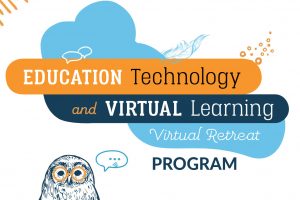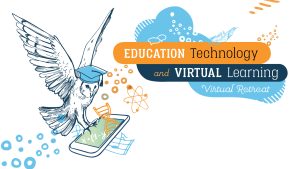
On May 17-20, 2022, Children and Screens hosted Education Technology and Virtual Learning, a groundbreaking, four-day, virtual research retreat designed to address compelling and critical questions about education technology use both inside and outside of the classroom, focusing on what has been learned and what still needs to be known about technology-based learning in light of the COVID-19 pandemic. Over 75 international, interdisciplinary researchers, educators, school administrators, clinicians, and nonprofit and government agency representatives convened for collaborative discussions on the uses, impacts, and future of education technology and virtual learning in the K-12 education system, with special considerations for future research and policy recommendations. The group spent each day focusing on major sectors of education technology, including: recent experiences of virtual learning among students, educators, and administrators; impacts to both learning efficacy and developmental outcomes; best practices for when and how to integrate technology into education; and key policy needs and considerations.
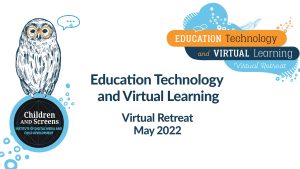
The retreat featured facilitated small group breakout sessions, which yielded rich discussion on key themes and topics:
- Evaluation Tools and Metrics
In order to properly evaluate education technology tools, uniform metrics and consideration of design are critical to ensure effectiveness, quality, and safety moving forward. In this future research, the harms and benefits of utilizing technology in education and virtual learning must be investigated. - Balancing Teaching and Learning Needs with Whole Child Development and Well-being
Research must look beyond current, standardized academic outcomes when examining education technology and digital learning. There is ample evidence that excessive screen time has negative cognitive, psychosocial, emotional, and physical health impacts on the developing child. Research and practice alike must consider how to balance the well-being of the whole child with teaching and learning practices. To do so may require looking beyond the “one size fits all” industrialized model of education. Future research should explore how technology could be utilized to benefit the individual needs and goals of each student (and teacher), instead of solely fitting these tools into existing educational models. - Training and Access
The experiences of teachers, administrators, and students around the country (and the world) are widely varied; some have excelled in a transition to digital learning tools and will continue to do so, while others have stalled or regressed due to challenges of access or knowledge. For technological tools and systems to be implemented effectively, it is essential that they are paired with early and consistent training, for both teachers and students. Educator training should include not only how to use the tools but also how to assess the effectiveness of the tools in relation to specific pedagogical goals. Even students, who may be more familiar with the tools from previous experience, should be informed on the learning uses of devices they may otherwise view as entertainment - Policy
Policies and regulations are integral to ensuring the privacy and safety of children using education technology tools, and independent auditing systems should be considered when developing these regulations. Transparency and accountability of edtech providers regarding the data they collect and how it is used is lacking, and must be addressed.
Highlights
Watch highlights from the Retreat.
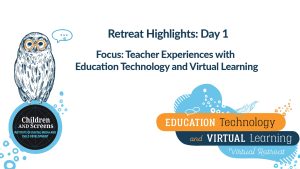
Day 1 – Tuesday, May 17, 2022 – What is the experience of teachers and administrators with education technology and virtual learning? What do researchers need to know?
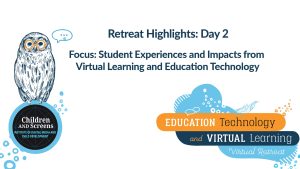
Day 2 – Wednesday, May 18, 2022 – What is the experience of students with education technology and virtual learning? What do researchers need to know?
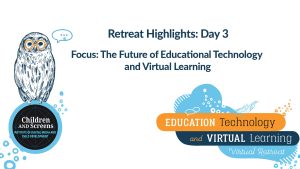
Day 3 – Thursday, May 19, 2022 – What do teachers and administrators need to know about the future of educational technology and virtual learning?
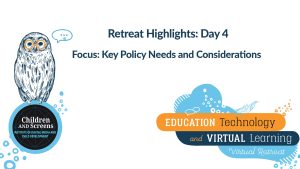
Day 4 – Friday, May 20, 2022 – What are the key policy needs and considerations for education technology and virtual learning moving forward?
Full Presentation Videos
Speaker presentations for all days of the retreat are available for viewing.
Robert Aguilar, PhD, Western Reserve Academy
June Ahn, PhD, University of California, Irvine
Elizabeth Albro, PhD, Institute of Education Sciences
Alan Arkatov, University of Southern California
Ayca Atabey, LLM, LLB, Digital Futures Commission, 5Rights Foundation
Andrew Bacher-Hicks, PhD, Boston University
Michael Barbour, PhD, Touro University California
Naomi Baron, PhD, American University *
Abigail Barnes, student
Kaylie Barnes, student
Mason Barnes, student
Michael Bazemore, PhD, Northcoast Preparatory and Performing Arts Academy
Criscillia Benford, PhD, Frameworks Institute *
Bill Bernhard, Ward Melville High School
Caroline Bird, student
Chandler Bird, student
Fran Blumberg, PhD, Fordham University
Faith Boninger, PhD, University of Colorado, Boulder
Kelley Brill, MA, WIFI Teens and Tech
Jill Bronfman, JD, MA, Common Sense Media
Katherine Carroll, teacher
Todd Cherner, PhD, University of North Carolina at Chapel Chill
Christina Chhin, PhD, U.S. Department of Education
Dimitri Christakis, MD, MPH, University of Washington Medicine, Seattle Children’s *
Joe Clement, MA, Teacher and author of Screen Schooled
Brian Cohen, teacher
Cory Cohen, teacher
Liz Cohen, MA, Whiteboard Advisors +
Christina Conolly-Chester, PsyD, NCSP, Montgomery County Public Schools
Jared Cooney Horvath, PhD, MEd, LME Global
Larry Cuban, PhD, Stanford Graduate School of Education
Jennifer Darling-Aduana, PhD, Georgia State University
Mei Dedini, student
Stefanie DiLorenzo, teacher, Ward Melville High School
Joseph DiNapoli, PhD, Montclair State University +
Chip Donohue, PhD, Donohue & Associates
Rebecca Dore, PhD, The Ohio State University
Victoria Dunckley, MD, Psychologist, Author, Screentime Expert
Alison Drain, MA, MSW, North Carolina Problem Gambling Program
Elizabeth Englander, PhD, Bridgewater State University
Molly Esquivel, teacher
John Ewing, PhD, Math for America *
Lara Faust, PhD, National Center for Education Research, Institute of Education Sciences
Amina Fazlullah, JD, Common Sense Media
Colter Feldman, student
Vivian Figures, BA, Alabama Senate
Carmen Gill Bailey, MD, City of Fairfax
Rebecca Griffiths, EdD, SRI International
Shayl Griffith, PhD, Florida International University
Lauren Hale, PhD, Stony Brook University
Monika Hanley, LLM, Center for Media Literacy
Brenna Hassinger-Das, PhD, Pace University
Marie Heath, EdD, Loyola University, Maryland
Carolyn Heinrich, PhD, Vanderbilt University *
Jenna Herdzina, MS, TEC Center at Erikson Institute
Troy Hicks, PhD, Central Michigan University
Erin Higgins, PhD, Institute of Education Sciences
David L. Hill, MD, Goldsboro Pediatrics, UNC School of Medicine
Velislava Hillman, PhD, London School of Economics and Political Science
Kathy Hirsh-Pasek, PhD, Temple University, Brookings Institution
Beth Holland, EdD, The Learning Accelerator
Mia Hower, student
Alice Huguet, PhD, RAND Corporation
Ford Hummel, student
Naomi Hupert, MEd, Center for Children and Technology at EDC
Pam Hurst-Della Pietra, DO, Children and Screens: Institute of Digital Media and Child Development *
John Hutton, MD, MS, FAAP, Cincinnati Children’s Hospital Medical Center
Preston Illman, student
Kristina Ishmael, MA, MS, Department of Education
Greg Jacobs, MS, Woodberry Forest School
Carrie James, PhD, Harvard Graduate School of Education
Christina Johnson, MEd, Dothan City Virtual School
Sara Johnson-Ward, MA, Virginia Public Education Partners
Samantha-Kaye Johnston, PhD, University of Oxford
Tessa Jolls, PhD, Center for Media Literacy
Kimberly Kelly, PhD, California State University, Long Beach
Lynne Kenney, PsyD, Wellington-Alexander Center
Helyn Kim, PhD, Institute of Education Sciences
Heather Kirkorian, PhD, University of Wisconsin-Madison *
Colleen Kraft, MD, University of Southern California
Natalia Kucirkova, PhD, University of Stavanger *
Randy Kulman, PhD, LearningWorks for Kids +
Tara Lacey, student
Robin Lake, MPA, Center on Reinventing Public Education (CRPE)
Alexis Lauricella, PhD, MPP, TEC Center at Erikson Institute
Catherine Lecuyer, JD, MBA, PhD, Mind-Brain Group, University of Navarra
LeeAnn Lindsey, ED, Edvolve +
Temple Lovelace, PhD, AERDF
Lucia Magis-Weinberg, MD, PhD, University of California, Berkeley
Cheryl Mahoney, MEd, LSW, OCPS, CHES, iWise Living +
Tracy Markle, MA, Collegiate Coaching Services, Digital Media Treatment and Education Center
Lance Mason, PhD, Indiana University Kokomo
Kristen Mattson, EdD, University of Illinois
Camillia Matuk, PhD, New York University
Sharon Maxwell, PhD, Maxwell Education
Chelsea Maxwell, MEd, Maxwell Education
Cherise McBride, PhD, University of California, Berkeley +
Alison McDowell, Independent Researcher
Martina Meijer, PS 310 Elementary School
Matt Miles, MEd, Teacher and author of Screen Schooled
Michael Milham, MD, PhD, Child Mind Institute
Libby Milkovich, MD, University of Missouri-Kansas City
Jessica Mislevy, PhD, SRI International
Alex Molnar, PhD, National Education Policy Center, University of Colorado, Boulder
Chrystalla Mouza, EdD, University of Delaware +
Lisa Nielsen, MA, NYC Department of Education
Meghan Owenz, PhD, Kutztown University
Martin Paulus, MD, Laureate Institute for Brain Research
Kris Perry, MSW, Children and Screens: Institute of Digital Media and Child Development
Sarah Prestridge, PhD, Griffith University
Detra Price-Dennis, PhD, Teachers College, Columbia University
Hannah Quay-de la Vallee, PhD, Center for Democracy and Technology
Jeff Raatz, BA, Indiana State Senate
Beth Rabbit, EdLD, The Learning Accelerator
Martina Rau, PhD, University of Wisconsin, Madison
Kecia Ray, EdD, K20Connect, LLC +
Justin Reich, EdD, Massachusetts Institutes of Technology *
Andy Ribner, PhD, University of Pittsburgh
Margaret Roscoe, student
Mark Rosenfield, PhD, SUNY College of Optometry
Anna Scattone, Middle School Teacher, New York City
Shilpa Sahay, PhD, Hunter College, CUNY
Travis Saunders, PhD, University of Prince Edward Island
Erin Scholes, MA, Beman Middle School and Vice Chair of AMLE (Association for Middle Level Education)
Sourav Sengupta, MD, MPH, University at Buffalo Jacobs School of Medicine and Biomedical Sciences +
Bzu Shiferaw, Fairplay
Office of Congresswoman Schrier, MD, Washington’s 8th Congressional District
Miri Shonfeld, PhD, Kibbutzim College of Education
Kelly Shrein, MEd, Northwood Elementary
James Siegener, student
Megan Silander, PhD, Center for Children and Technology at EDC +
Bill Softky, PhD, co-author, Sensory Metrics of Neuromechanical Trust
Jeffrey Solan, Cheshire Public Schools
Louise Starkey, PhD, Victoria University of Wellington
Rebecca Stephenson, PhD, Loyola Marymount University
Kristen Turner, PhD, Caspersen School of Graduate Studies, Drew University *
Amelia Vance, JD, Penn State Law and William & Mary Law School
Cody Venzke, JD, Center for Democracy and Technology
Jon Wargo, PhD, Boston College
Ellen Wartella, PhD, Northwestern University *+
Paul Weigle, MD, Hartford Hospital
Cortney Weisman, teacher, Ward Melville High School
Emily Weinstein, EdD, Harvard Graduate School of Education +
Blythe Winslow, BA, MFA, Everyschool.org
Charles Xie, PhD, Institute for Future Intelligence
Michael Young, PhD, University of Connecticut
Jennifer Zosh, PhD, Penn State University (Brandywine)
—
* Education Technology and Virtual Learning Retreat Planning Committee Member
+ Self-declared Conflict of Interest (through funding or roles as an advisor, consultant, or other role for an Education Technology or other tech-industry organization or their associated philanthropies)
